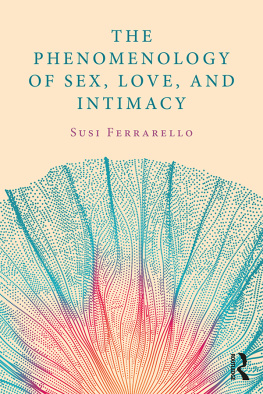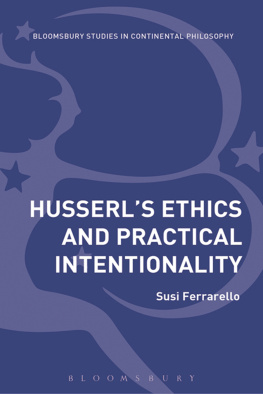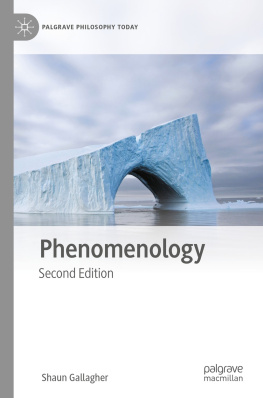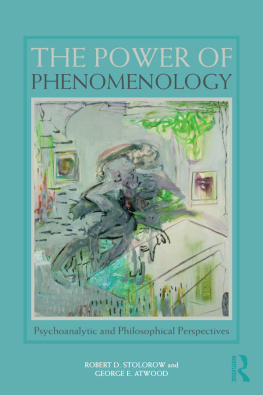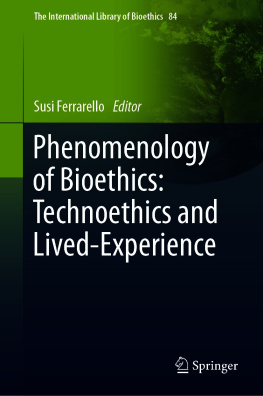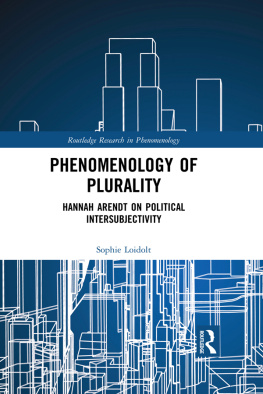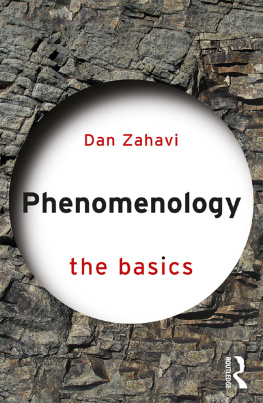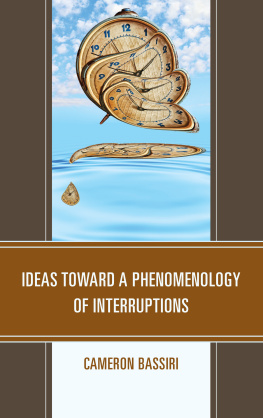Table of Contents
Pages
THE PHENOMENOLOGY OF SEX, LOVE, AND INTIMACY
The Phenomenology of Sex, Love, and Intimacy presents a phenomenological exploration of love as it manifests itself through sexual desires and intimate relationships. Setting up a unique dialogue between psychology and philosophy, Susi Ferrarello offers a perspective through which clinicians can inform their practice on diverse issues of human sexuality.
Drawing on Husserls phenomenology, Ferrarellos analysis of love spans a range of disciplines including psychology, theology, biology, epistemology, and axiology, as well as areas related to gender, consent, and political control. Combining Husserlian perspectives on ethics with a focus on lived-experience, this text will deepen therapists understanding of love as the subject of interdisciplinary inquiry and enable them to locate questions of sexuality and intimacy within an academic framework.
With key theoretical principles included to allow clinicians to think through and clarify their practice, this book will be a valuable tool for sex therapists, marriage and family therapists, and counselors, as well as psychology and philosophy students alike.
Susi Ferrarello is a professor at California State University and Saybrook University, teaching philosophy to graduate students of psychology. She holds a PhD in Philosophy from Sorbonne and an MA in Human Rights and Political Science from the University of Bologna.
THE PHENOMENOLOGY OF SEX, LOVE, AND INTIMACY
Susi Ferrarello

First published 2019
by Routledge
52 Vanderbilt Avenue, New York, NY 10017
and by Routledge
2 Park Square, Milton Park, Abingdon, Oxon, OX14 4RN
Routledge is an imprint of the Taylor & Francis Group, an informa business
2019 Taylor & Francis
The right of Susi Ferrarello to be identified as author of this work has been asserted by her in accordance with sections 77 and 78 of the Copyright, Designs and Patents Act 1988.
All rights reserved. No part of this book may be reprinted or reproduced or utilized in any form or by any electronic, mechanical, or other means, now known or hereafter invented, including photocopying and recording, or in any information storage or retrieval system, without permission in writing from the publishers.
Trademark notice: Product or corporate names may be trademarks or registered trademarks, and are used only for identification and explanation without intent to infringe.
Library of Congress Cataloging-in-Publication Data
A catalog record for this title has been requested
ISBN: 978-0-8153-5809-1 (hbk)
ISBN: 978-0-8153-5810-7 (pbk)
ISBN: 978-1-351-12326-6 (ebk)
Typeset in Bembo
by Wearset Ltd, Boldon, Tyne and Wear
To Fabiola Ferrarello, with love and gratitude
CONTENTS
What Do We Talk About When We Talk About Love?
I never thought that love would have been the subject of my philosophical studies, partly because I always assumed that that kind of investigation would pertain to different areas of human studies, such as poetry, music, art, and the like; partly because I believed that something whose nature is so ephemeral should never be questioned, otherwise its essence would fade away. Yet, as it often happens, we cannot decide what direction our studies are going to take. A few years ago, I was invited to hold a series of lectures for a newborn program on Human Sexuality, in San Francisco. I accepted the invitation with great enthusiasm, which soon turned into a state of anxiety when I realized the breadth of study that this area would have required.
Love seems to be the main constituent of the human soul; one discipline is not enough to shed light on its essence. Amore ipsa notitia est Gregory the Great wrote in his Homelia in Evangelium, 2love itself is knowledge. The graduate and undergraduate programs on human sexuality that are burgeoning today seem to have the difficult task of educating people on a vital subject (that for reasons I cannot address here was neglected for centuries) that encompasses different disciplines and therefore requires overcoming the obsolete boundary between Geistes- and Natur-Wissenschaften. Hence, when I started preparing for these lectures I easily understood that philosophy alone was not adequate; biology, chemistry, neurology, anthropology, geography, history religion, psychology, and many more disciplines needed to be included in this conversation on love. I started collecting a vast bibliography that later on I organized by themes and concepts.
The more I read, the more I felt a strong sense of responsibility growing in me. In fact, I realized how much violence, injustice, and inequality had hidden over the centuries behind the word love. The fact that love was never duly investigated by a rigorous research paved the way for the most painful episodes in our personal and collective history. For this reason, I am grateful for all academic and non-academic programs that are currently investing energy and funds in designing curricula to train people in being responsible for the love they receive and give. Thus, this sense of gratitude led me to the decision to start writing my lectures and to organize them in a book with the hope that the material and the thoughts I collected could be of use.
After the reading phase of my work, I felt of course overwhelmed and very hesitant about the direction to take, the language to use, the discipline to privilege. It was at that point that Husserls phenomenology came at hand. Even though I briefly referred to other phenomenologists, I preferred using his way of applying phenomenology because it was in line with the goal of my meaning-making analysis. According to Husserl, phenomenology is a Wissenschaftslehre: a science that organizes the knowledge collected by all the other sciences. So, in these lectures I used phenomenology as descriptive language to organize and describe what other disciplines observed about the nature of love and I used lived-experience as the point of departure for my observation and study. As the analysis unfolded I realized that what I discovered in my previous books, in particular concerning the notion of practical intentionality, could be of use here to capture and express my understanding of love. For this reason some of the parts of this book will refer to and make use of my previous work (Ferrarello, 2015, 2018).
The Names of Love
Another problem I had to face waswhat kind of love did I want to talk about in these lectures? Love can take so many names that it is very easy to get lost and miss the opportunity for an actual dialogue on the topic. Love can reveal itself through affection, empathy, emotions, drives, sentiments, understanding, time, and so forth. I believe we cannot separate the essence of love from these constituents; yet I needed to identify the main signifiers in order to open up a dialogue that was understandable and acceptable to everybody.
For this reason my resolution for this book was to use the Greek language to name three main layers of love: eros, philia, and agape. In the first part, I describe how desires, drives, and instinctswhat Greek calls erosadd meaning to our identity, even when they are considered wrong and rejected by the society. Then in the second part I observe how intimacy, in Greek

